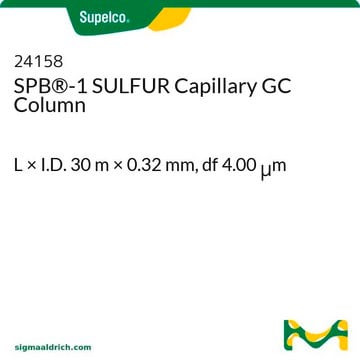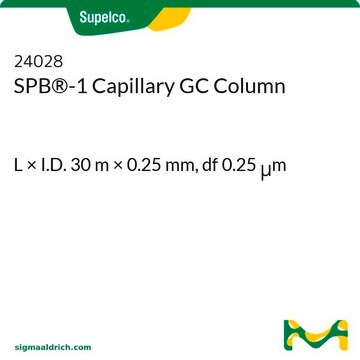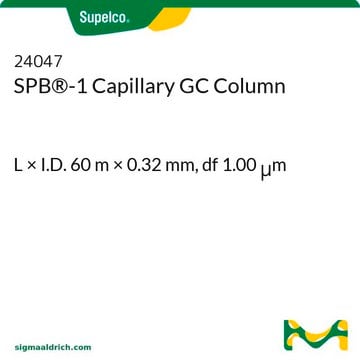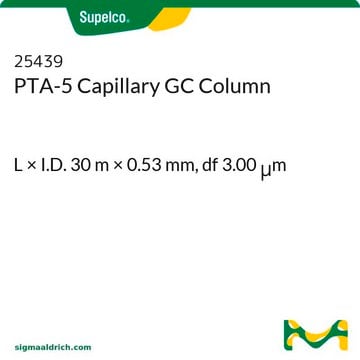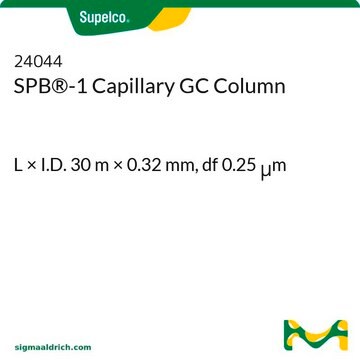24296
SPB®-1 Capillary GC Column
L × I.D. 30 m × 0.32 mm, df 5.00 μm
Sign Into View Organizational & Contract Pricing
All Photos(1)
About This Item
UNSPSC Code:
41115710
eCl@ss:
32119290
Recommended Products
material
fused silica
Agency
meets requirements for USP G1, G2, and G9
parameter
-60-300 °C temperature (isothermal or programmed)
Beta value
16
df
5.00 μm
technique(s)
gas chromatography (GC): suitable
L × I.D.
30 m × 0.32 mm
matrix active group
Bonded; poly(dimethyl siloxane) phase
column type
capillary non-polar
Looking for similar products? Visit Product Comparison Guide
Related Categories
General description
Capillary GC column is also known as open tubular column. The carrier gas flows through the central aperture and is unrestricted throughout the length of the column.
Application: This column is often used for traditional general purpose applications, where a non-polar column is required. Analytes will be separated primarily according to boiling point.
USP Code: This column meets USP G1, G2, and G9 requirements.
Phase:
USP Code: This column meets USP G1, G2, and G9 requirements.
Phase:
- Bonded
- Poly(dimethyl siloxane)
- ≤0.32 mm I.D., <2 μm: -60 °C to 320 °C (isothermal or programmed)
- ≤0.32 mm I.D., ≥2 μm: -60 °C to 300 °C (isothermal or programmed)
- ≥0.53 mm I.D., <2 μm: -60 °C to 300 °C (isothermal) or 320 °C (programmed)
- ≥0.53 mm I.D., ≥2 μm: -60 °C to 260 °C (isothermal) or 280 °C (programmed)
Other Notes
We offer a variety of chromatography accessories including analytical syringes
Legal Information
SPB is a registered trademark of Merck KGaA, Darmstadt, Germany
Choose from one of the most recent versions:
Already Own This Product?
Find documentation for the products that you have recently purchased in the Document Library.
A H Freytag et al.
Plant cell reports, 7(1), 30-34 (1988-01-01)
Six sugarbeet (Beta vulgaris L.) lines (GWI-248, SPB-11, MonoHy 55, SMS-1, EL45 and FC607) were tested for regeneration. Shoot cultures were initiated in vitro from naked, sterilized embryos obtained from mature seed. Excised petioles from cultured shoots were plated on
Scott RPW.
Introduction to Analytical Gas Chromatography, 101-102 (1997)
Our team of scientists has experience in all areas of research including Life Science, Material Science, Chemical Synthesis, Chromatography, Analytical and many others.
Contact Technical Service
